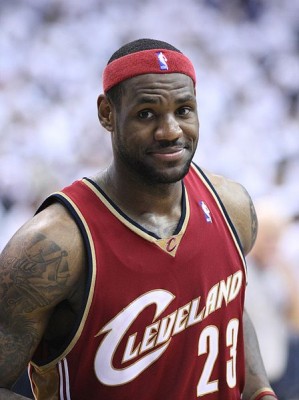
LeBron James (photo by Keith Allison)
That young people look up to Hollywood stars and professional athletes as role models is a fact of life. Often, these superstars disappoint us by revealing that they, too, are only human. This is an especially difficult reality for children to accept. We want — and we need — heroes. Superheroes, even. For a brief bit after 9/11, we fixated on firefighters and police officers as superheroes. Rightly. But it didn’t last.
Every now and then we also come to see teachers as superheroes. Randy Pausch, a computer science professor at Carnegie Mellon University, became a superhero to many after writing The Last Lecture and documenting his ferocious fight against pancreatic cancer. When he died on July 25, 2008, the world wept.
And then there is Dr. David Benke, the middle-school math teacher who in February tackled a gunman in Littleton, Colo. after the gunman opened fire on students at his school. Assisted by colleagues, Benke was able to restrain the assailant until police arrived. No one died.
But it is not teachers who routinely top the superhero lists.
Among the many athletes who do, one could fill an entire book with huge and heartbreaking letdowns: Tiger Woods, Marion Jones, Flyod Landis, Michael Vick, Ben Roethlisberger, Barry Bonds, Roger Clemens, A-Rod, Manny Ramirez, Mark McGwire … you get the picture. Not exactly people we want our children to emulate, even if we envy their financial success and fame.
Some people wanted to add LeBron James to this list last night, after he announced on live TV and with much fanfare that he was leaving behind the Cleveland Cavaliers for the Miami Heat. Young and old in Cleveland felt betrayed. Some hometown fans began burning their LeBron jerseys. A riot wouldn’t have been entirely unexpected.
But what shocked me most was the letter Cavs owner Dan Gilbert wrote and then posted on the team’s website. If ever there were a pitch-perfect example of how not to be a role model — how not to respond to disappointment or a break that didn’t go your way — this is it.
Gilbert has just taught kids everywhere what it means to be a sore loser.
Not only was Gilbert’s rhetoric way off — accusing LeBron of “cowardly betrayal,” as if LeBron had no right to play for another team — but his letter was also riddled with poor English and poorer punctuation.
Gilbert also went way overboard on his use of bold and caps. But the kicker that gave away his rambling letter as that of a snotty, sniffling five-year-old who’s just been told he lost was Gilbert’s choice of font: Comic Sans. Who over the age of 10 writes in Comic Sans?!?
More importantly, what lessons will children learn from adults like Gilbert who behave so childishly?
Postscript: for a look at where the proceeds of last night’s TV show are headed, see this piece in the Christian Science Monitor. The show was sponsored in part by the University of Phoenix but “all proceeds from ads sold for the broadcast – expected to be between $2 million and $2.5 million – will be donated to the Boys and Girls Clubs of America,” according to the Monitor. Thanks to Sarah Garland for drawing my attention to this article.



